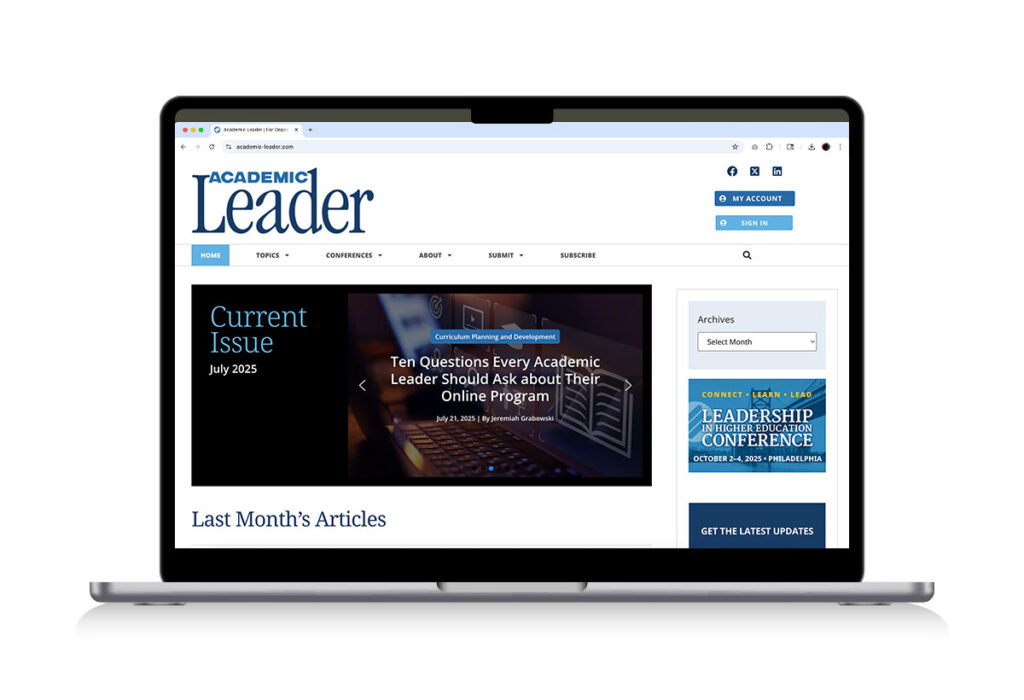Rewarding Excellent Support for Non-tenure-track Faculty, Part I
For decades, campuses have hired increasing numbers of non-tenure track faculty. The number of adjunct faculty is now more than 52 percent of faculty nationally and full-time non-tenure track make up another 18 percent of the faculty, with all types of non-tenure-track faculty (NTTF) accounting for 70 percent of faculty...
Pitfalls of Using Student Comments in the Evaluation of Faculty
The use—or misuse—of student ratings of instruction (SRIs) in faculty evaluation is a frequent topic in higher education news. Unfortunately, popular press articles on the topic often garner more attention than the vast empirical literature. A recent review of the research by Linse (2017) pointed to common misperceptions about SRIs,...
Teaching and Learning Centers as Catalysts for Faculty Diversity Development
Consider the experience of Jordan, a fourth-year political science major, who was told by his professor that many African-American students do not pass her class (Brooms, 2017). This stereotyping can create a self-fulfilling prophecy, or what Claude Steele describes as a “stereotype threat,” which impacts students’ performance by challenging their...
Emotional, Physical, Financial, and Mental Health Effects of Noncollegial Colleagues
Tracy Ford has just completed her PhD and is searching for a full-time position in a university. She is a much sought-after young academic as she has published six articles and presented at a national conference. Also, she has experience in teaching in an adjunct position, and her evaluations were...
Five Tips for Making Tenure
While the words “tenure track” make it sound like there’s a smooth set of rails that will take you from hiring through to a position on the permanent tenured faculty, “tenure obstacle course” might in fact be a better description.
Collegiality: The Cornerstone of a University (and a Profession)
Accepting and sharing responsibility for creating a productive work setting within the department and institution result, at least to a great extent, from how well each member of the community carries his or her own fair share of the common workload. The challenges faced by higher education institutions in the...
Speed Mentoring
Mentoring is a common yet powerful way for people to learn a variety of personal and professional skills. Most adults can identify a person who, at some time in their lives, had a significant, positive influence on them. While some mentoring relationships are formal, with clear goals and regular meetings,...
How to Evaluate Your Faculty Development Services
Faculty developers across the nation are working on developing methods to evaluate their services. In 2010, the 35th Annual Professional Organizational and Development Network Conference identified assessing the impact of faculty development as a key priority. It was this growing demand that spawned my interest in conducting a 2007 statewide and...
How to Talk Yourself out of a Job
We tend to think of interviews as processes that select suitable candidates for different jobs. But in many ways the purpose of interviews is more accurately to reject unsuitable candidates. After all, by the time a search reaches the stage of meeting a few finalists on campus, the institution has largely been...
Approaches to Building and Sustaining a Diverse Adjunct Workforce
With nontenure-track faculty now comprising 70 percent of the faculty workforce, academic leaders face daunting challenges in creating proactive workplace strategies that address this new reality. Even though more than a quarter of nontenure-track faculty are now in full-time nontenure-track appointments, the majority still teach part time. Despite the urgency...










